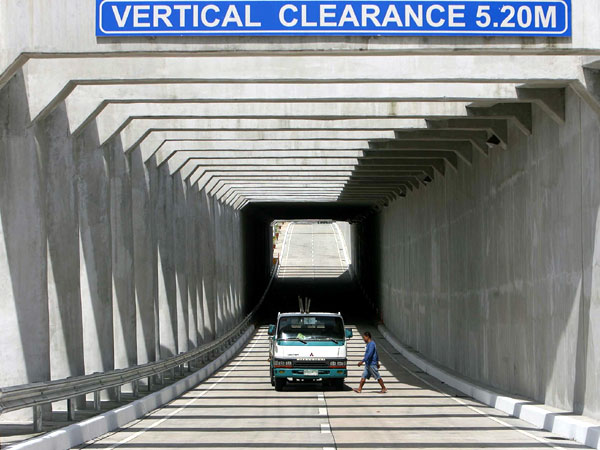
THE 44-meter underpass was completed three months ahead of schedule. PHOTO/MARIANNE BERMUDEZ
MANILA, Philippines–Faster travel and fuel savings now await thousands of motorists and commuters negotiating Quezon Avenue and Araneta Avenue in Quezon City every day.
The P430-million underpass on the corner of the busy intersection was finally completed and opened Friday noon, three months ahead of schedule and cheaper by more than P200 million, after 15 months of construction.
President Aquino, who rode a pickup with Speaker Feliciano Belmonte Jr. and Public Works Secretary Rogelio Singson for the inaugural drive through the 440-meter interchange project under a downpour, praised public works officials for a job well-done.
“Who wouldn’t be impressed? The original P694-million budget was reduced to P430 million, and it was completed ahead of schedule,’’ Mr. Aquino said in brief remarks.
The underpass is projected to ease traffic congestion on both major thoroughfares that are traversed by more than 100,000 vehicles every day.
“This will bring much relief to the people,’’ Singson said.
Originally, it was projected to be completed in 18 months, from June 20, 2011 to Dec. 10, 2012, and was allocated P694.15 million in the national budget. After some changes in the design, the projected cost was reduced to P534.6 million. The final cost was pegged at P430 million.
“This project is very important because more than 100,000 vehicles pass through here every day. If you save up P6 in gas, that’s P20 million a month, and P240 million a year. We spent P430 million; in two years we will recover that because of the savings in gas,’’ Singson told the President in a briefing inside a tent.
The savings in the project could be used for other projects in the city, he added.
The underpass stretches for 440 meters, and has two lanes in opposite directions. Its construction led to the improvement of the road, as well as installation of street lights and drainage facilities.
DPWH Undersecretary Romeo Momo, who is in charge of regional operations, said that the underpass would not be flooded even if heavy rains hit Metro Manila.
President Benigno S. Aquino III, accompanied by House Speaker Feliciano Belmonte, Jr., Public Works and Highways Secretary Rogelio Singson and Quezon City Representative Jorge Banal, leads the inaugural drive-through to formally open the Quezon-Araneta underpass in Quezon City on Friday. MALACAÑANG PHOTO
A portion of Araneta Avenue is usually flooded during a heavy downpour. Residents in the area also become instant evacuees as they usually had to flee their homes when it rains.
Momo said that all measures were taken to address potential problems like flooding in the area. He said the DPWH increased all the drainage capacity in the particular junction.
According to Momo, the underpass was designed with three submersible pumps and a water cistern that can suck out 277 liters of water a second in case of flooding, and an electric generating set for standby power. It has diaphragm walls that serve as retaining walls.
“We put a huge cistern that will be connected to a pumping system. These three pumps will pump out all the excess water that is collected at the cistern. This is the same design we used in the other underpasses,” he said.
“This is not the first underpass that DPWH has done. We have underpasses in EDSA, Quezon Avenue and Makati City which do not submerge in floods,” Momo added.
Furthermore, he explained that the Quezon-Araneta underpass was built on an elevated ground, which minimized the possibility of flooding.
Earlier in the day, the President inaugurated the North Rizal Water System Project in Barangay Payatas, Quezon City, which will service residents in Quezon City, Marikina and San Mateo town in Rizal.
“North Rizal Water System Project will use its own transmission mains to bring quality water to more or less 1 million residents of East Zone,’’ he said in his speech.